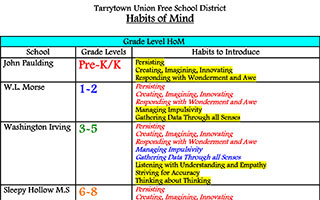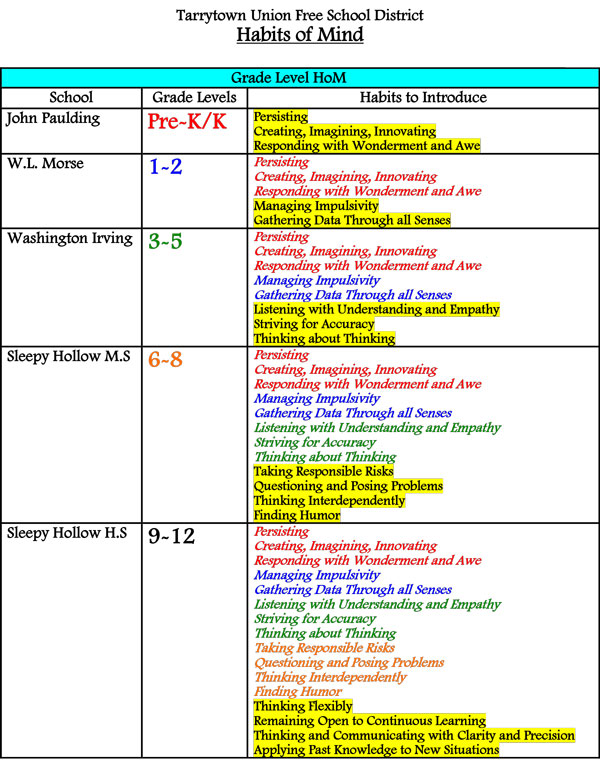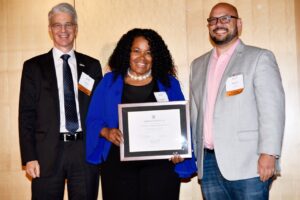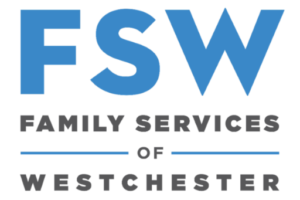 Students of the Public Schools of the Tarrytowns are learning a few extra things this year apart from what has been dictated by the Common Core. A new program called Habits of Mind has been put in place across the district in grades K-12, and administrators and faculty aim to help students create tools they can use not only in their academic lives, but outside of school as well.
Students of the Public Schools of the Tarrytowns are learning a few extra things this year apart from what has been dictated by the Common Core. A new program called Habits of Mind has been put in place across the district in grades K-12, and administrators and faculty aim to help students create tools they can use not only in their academic lives, but outside of school as well.
“Habits of Mind is a district initiative, K-12, to really get kids in the process of metacognitive thinking about mindfulness,” says Beth Lopez, Principal of Sleepy Hollow Middle School. “It’s designed to give kids a toolkit, a strategy to use when they’re presented with a problem that doesn’t have an apparent solution… If you have lots of different things to draw on, you act in a way that takes a lot into account, rather than acting impulsively.”
“It’s the opposite of the test-taking culture that we are so much involved in for better or for worse,” says Superintendent Christopher Clouet. “This has nothing to do with tests, this has to do with thinking and thinking through problems. This goes beyond, ‘What number did you get on a test?’ These are things that students will carry on into life.”
While this is the first year that Habits of Mind have been taught in the District, the program has been around for many years and is in schools all over the world. “I’ve been aware of it for a number of years, and I was able to reach out to one of the authors and bring her in,” says Dr. Clouet, who introduced the program to a group of District teachers and administrators last year and participated in a book club centered around Habits of Mind and other publications. “That was a very inspiring piece of this.”
First, Dr. Clouet formed a committee to look into bringing Habits of Mind to the District. They studied literature and visited a number of school districts where the program was already in place. Middle School Counselor Miriam Ocasio was a part of this committee and was on board from the start. “These are not just tools for school and academics,” she says. “These are tools that kids can take outside of school and apply in their lives, careers, colleges, relationships. I see it as addressing the whole child.”
In their book, “Discovering and Exploring Habits of Mind,” authors Arthur Costa and Bena Kallick identify 16 distinct habits of successful individuals from all walks of life. These habits run the gamut from perseverance to taking responsible risks to applying past knowledge to new situations (the full list of the Habits of Mind, is at RiverJournalOnline.com). Once it was decided to implement the program, the committee decided which habits to introduce at which grades, focusing on age appropriateness and allowing the habits to build on one another over the years.
“There are 16 habits, but we wouldn’t expect kindergarteners to learn all 16 habits at once,” says Dr. Clouet. “So we introduce two in kindergarten, then it expands to four in the first grade, and so on. By the time you’re in highschool you have all 16.”
One of the key selling points to the program is that it does not require any specific curriculum. Rather, the instruction is embedded into the regular lessons in the classroom. “We’re not buying a package, or buying a program,” says Dr. Clouet. “This isn’t costing us any money. We haven’t had to invest funds or anything, because it’s really meant to be home grown.”

“The teachers find opportunities within the classroom lessons to use one of the habits,” says Ocasio. “They are constantly finding ways to weave the habits into their class.” In the Middle School, the Habits of Mind instruction has replaced the character instruction students were already receiving. “We’ve always done character presentations in the classroom. We were using ‘7 Habits of Highly Effective Teens’,” says Principal Lopez. “The interesting thing about Habits of Mind, in my opinion, is that the authors spent a lot of time studying what effective people do when they’re faced with problems that don’t have apparent solutions. I think isolating some of the key skills and strategies that people apply is a little different from what 7 Habits do.”
The District hopes lessons learned through the Habits of Mind will expand beyond the walls of the schools and into the students’ homes and their everyday lives. “What this does, we hope, is to develop a vocabulary for the kids, and the teaching professionals, and even for the parents so that everyone isn’t saying things in different ways that may be confusing,” says Dr. Clouet. “What we want to do is have parents become more knowledgeable about it through meetings and through other things like that, where we can have some evening events and talk about it.”
While it is far too early to know whether or not the program is a success for the District, some of the early indications are positive. “The feedback that we’ve been getting from kids at the end of the presentations has been very positive,” says Principal Lopez. “You can hear kids talking about it in their conversations, how it relates to them personally. I think it’s good for kids, and I’d like to see, over time, how it impacts kids. I think it will really make a long-term difference and I’m excited to see that as we continue down this road.”
“If it’s a success, I think we would see kids being able to respond to situations and challenges in their life using some of these habits and maybe giving voice to them,” says Dr. Clouet. “However, in four or five years if we see that no one is using it, no one is responding to it, no one is taking ownership of it, then we would revisit the program.”
Dr. Clouet is quick to point out that Habits of Mind is not intended to be some magical, life-altering experience. It is simply a slightly different way of thinking that they feel will benefit students. “We all have habits,” he says. “They can be good habits or bad habits. This is an explicit attempt to draw kids’ attention to good habits and thinking habits.”
“These are lifelong skills that kids will take outside into the world,” says Ocasio. “Given the globalization of the world, they’re going to be constantly connected with the world and these are very good skills to help facilitate those connections, help them work better in teams. They’re lifelong skills and that’s one of the greatest things about Habits of Mind.”






